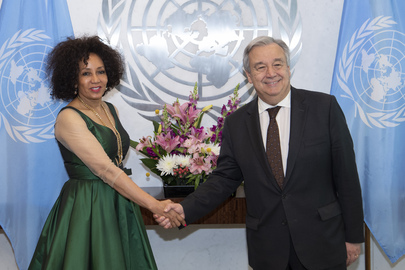Opinion: We should be careful to celebrate SA’s election to UN Security Council
The relationship between Africa and the United Nations (UN) has always been one that is laden with complexities. Africa, throughout history, has been at the center of the discussions at the UN.
Although there has been much talk about Africa there has not been much talk with it and, more so, its role within the UN. African countries are among the largest regional groupings in the UN, yet this grouping does not necessarily translate into proactive decision-making. This is because the highest decisions are taken by countries that are permanent member states of the Security Council and no African country is a permanent member.
South Africa recently got elected to serve as a non-permanent member in the UN Security Council for the term of 2019-2020. Minister of International Relations and Cooperation Lindiwe Sisulu expressed “profound gratitude” for this election but the question that remains is, what does this election mean for South Africa and Africa at large?
President Cyril Ramaphosa stated that the membership “will be used to advance the priorities of the AU Agenda 2063 and to address the root causes of conflict, including inequality, underdevelopment and promoting inclusive political dialogue”.
This election is indeed captivating, but it is not without its complications and controversies. It does, at face value, offer some hope but it must be approached critically in determining whether or not it can be helpful in addressing the problems of Africa which are replete with extreme complexity and historical trauma. There is no other continent that has gone through what Africa has gone through in the past couple of centuries. From slavery, colonisation and apartheid this continent has experienced mass theft and plunder of Africa’s resources for the benefit of the West.
This historical fact should always be borne in mind if we are to have a genuine conversation around how African states can participate meaningfully as members of the UN and to what extent they can advance an African agenda.
There are large gaps of legitimacy that the UN as a structure must deal with in order to cure some of the historical problems. Worthy of being noted is the fact that the UN was long and firmly established when colonisation and, in the case of South Africa, apartheid was happening. Some of its permanent member states were at the forefront of the colonisation project; a system anchored by blatant violation of human rights and the denial of African countries to self-determine.
What then does it mean to celebrate being part of the structure that has been complacent if not instrumental in the oppression and subjugation of African countries?
Former president of Zimbabwe Robert Mugabe strongly criticised the UN for not taking Africa seriously and questioned why after so many years of independence of some Africa states there has never been a single country from the continent that is a permanent member.
What this article begs is that South Africa, as a newly elected non-permanent member of the Security Council, must be critical when it comes to the history and context under which it finds itself a member. Having an African country member could be both catastrophic and reconstructive at the same time. It can be reconstructive because it seeks to bring about peace and security and can fight injustice but yet creates victimhood. This is to say African countries become victims.
Even though the UN as a structure is well meaning the reality is that it is still fundamentally Eurocentric. Western countries still have more power within the structure and this has the effect of reducing the views of African countries into surrogate or proxy views. The election of South Africa might be a step towards undoing this but for that to happen we must be critical and cognisant of where we are located within the structure.
In conclusion, South Africa finds itself within a historical continuum of a Eurocentric project and structure in which African actors are cast into superior and inferior positions. South Africa must therefore understand that it is carrying not only a mandate of its citizens but that of the entire continent which has been deliberately silenced for centuries.
This is not a plea for the ?UN to be more sensitive to African countries. This is also not a wholesale rejection of the UN as a structure that might help bring peace, stability and the maintenance of peace and political order. This is to point out that though we might celebrate member status of South Africa in the UN, much more is needed if the deeply embedded inequalities and problems of Africa are to be addressed.
Member status is not adequate for the emancipation of Africa. It is important that we remember the wisdom of Thomas Sankara, who taught us that the West will never help us solve the problems that it created and still benefits from. This is no victory for South Africa but a strategic manoeuvre. Our solutions will come from us. Africa for Africans.
–Mcebo Freedom Dlamini s a former Wits SRC President and student activist. He writes in his personal capacity.
News24

